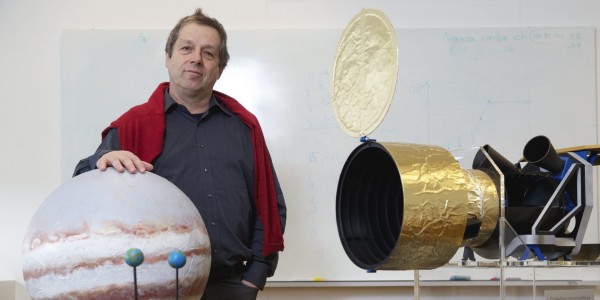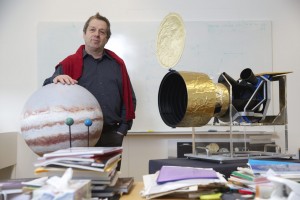
Dear Reader,
You are looking at the first edition of the e-Newsletter of the National Center for Competence in Research (NCCR) PlanetS. The Swiss National Science Foundation launched PlanetS in June 2014 as a response to an astronomical revolution. The one spawned by the discovery in 1995 of the first planet orbiting another solar-type star by our colleagues Michel Mayor and Didier Queloz. After two decades of extraordinarily successful but only loosely coordinated efforts by the various groups in Switzerland involved in planetary research, it was time for a major change. It was time for PlanetS.
PlanetS provides an interdisciplinary research program dedicated to the study of the origin, evolution, and characterization of planets. By means of laboratory analysis, ground- and space-based astronomical observations and in situ measurements, theoretical and numerical modelling PlanetS strives at a better characterization and understanding of planetary systems by using integrative approaches. The Center regroups over 60 scientists from different research institutions across Switzerland (the Universities of Bern, Geneva, Zürich and the ETHs in Zürich and Lausanne) working together in what represents the largest coordinated research effort in astronomy in Switzerland.
Of course, assembling individual research teams used to work separately and even to compete against each other into a coherent research organisation, which can efficiently exploit synergies is by no means a trivial task. Old habits have to be forgotten to allow for a new creative thinking that can see and exploit the opportunities created by pooling resources and expertise. The challenge of reconciling a strong local identity with a partnership in a global undertaking is not to be underestimated in a country as decentralised as Switzerland!
Almost incredibly, after slightly less than one year of activities, the magic seems to operate. The new becomes more attractive than the old as the incredible opportunities made possible by PlanetS become apparent. New ideas, new research interests across institutions and methods, are flourishing. Of course, enormous work is still ahead to transform these ideas and interests in actual scientific results. But creativity and enthusiasm, which are the major drivers of successful scientific research, are definitively all over the place!
PlanetS is more than a pure research organisation. Knowledge and technology transfer represents one of its many other priorities. When and wherever possible, PlanetS seeks the contact with the private sector in an effort to exchange know-how, expertise, processes, and people. It also provides support and mentoring for young scientists in the form of a doctoral network, encourages mobility by seeking closer ties to distinguished institutions abroad, and strives at providing a family friendly and an equal opportunity work environment. Last but not least, as evidenced by this Newsletter, PlanetS aims at sharing scientific results and the passion of its researchers for their work with fellow scientists and the general public.
I hope you will be able to feel the excitement while reading this first edition!

Willy Benz,
Director NCCR PlanetS
Categories: External Newsletter

